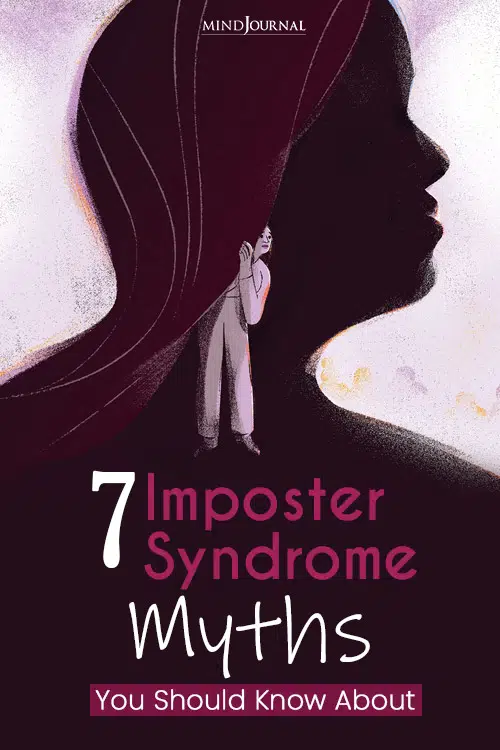“The beauty of the impostor syndrome is you vacillate between extreme egomania and a complete feeling of: ‘I’m a fraud! Oh God, they’re on to me! I’m a fraud!’ . . . just try to ride the egomania when it comes and enjoy it, and then slide through the idea of fraud.” – Tina Fey
These days, everyone’s talking about it.
In some respects, that’s extremely good news for Sensitive Strivers. Because, as highly sensitive people, we are more likely to experience imposter syndrome, and seeing so many articles, podcasts, and experts speaking about the subject can be reassuring.
Finally, you can see that you’re not the only one who feels like a fraud. You aren’t the only one constantly questioning whether you deserve your success or worrying that you’re going to be “found out.”
Of course, there’s a flipside. The more people there are talking about it, the more the knowledge can become warped. And that same Google search will confirm something else: There are plenty of imposter syndrome myths.
That’s less helpful, because if you want to tame your own imposter syndrome, first you have to understand it. And you don’t just have to understand it in a general sense—you have to recognize how it connects to your highly sensitive personality.
So let’s clear up a few of these imposter syndrome myths so that you can start unlocking your true potential.
Related: Imposter Syndrome Symptoms – The Power Of The Little Voice
7 Imposter Syndrome Myths Debunked
Myth 1: Imposter Syndrome Is Not Real.
“Stop taking things so personally!”
This is by far the worst of the imposter syndrome myths. As a sensitive person, you’re probably used to people telling you to grow a thicker skin. When you express doubt or share your thoughts relating to imposter syndrome, those who’ve never experienced it likely invalidate your feelings, telling you that it’s all in your head or something you have to “get over.”
However, it isn’t all in your head: it’s very real.
In fact, imposter syndrome has been extensively researched for the last 40 years across different environments including academia, medicine, and the corporate world. One thing that the scientists and researchers all agree on is this: Imposter syndrome exists.
Myth 2: Imposter Syndrome Is A Mental Health Condition.
Just because you experience imposter syndrome, does not mean there is something wrong with you. It’s commonly referred to as a syndrome, and many people liken it to a mental health diagnosis.
But imposter syndrome is better described as a phenomenon because, unlike mental health conditions like depression or anxiety, it isn’t pervasive across all parts of your life. It usually only presents in certain situations—especially professional ones that you perceive as stressful, challenging, or demanding. Imposter syndrome tends to occur at certain times and under certain conditions and is not an inherent, unchangeable part of who you are.
Doubting your capabilities doesn’t mean you are pathological, but rather that you have a habitual pattern of thinking that you are a fraud and unqualified for success. Which, with the right tools and practice, can be changed and corrected to help you become more confident.
Related: How To Defeat Imposter Syndrome and Bring Success Into Your Life
Myth 3: Imposter Syndrome Only Affects Women.
When imposter syndrome was first observed, it was seen primarily in high-achieving women. But now studies show that it’s equally common in men.
One U.K. survey found 52% of female respondents and 49% of male respondents said they struggle with imposter syndrome “daily” or “regularly”. Across all age groups (from adolescents to late-stage professionals), it affects up to 82% of professionals.
Imposter syndrome is particularly prevalent among minority groups, including those who are marginalized because of race, ethnicity, or neurological differences. This encompasses Sensitive Strivers. Since Sensitive Strivers makeup only 15-20% of the population, process the world more deeply, and function differently in the workplace, they tend to feel like outsiders.
Myth 4: Imposter Syndrome Is Your Fault.
Many Sensitive Strivers with imposter syndrome assume that having it is their fault—for not being smart enough, stronger enough, capable, or good enough.
This is 100% false.
Sensitive Strivers are more susceptible to imposter syndrome because of their heightened perceptiveness, depth of processing emotions, thoughts, and the world around us. They tend to have heightened nervous systems which can equate to being more easily stressed and overwhelmed by challenges, and more emotionally reactive.
So while imposter syndrome is more common for Sensitive Strivers because of their biology, it’s something that can be managed.
Myth 5: The Most Confident People Don’t Experience Imposter Syndrome.
Some of the world’s most successful people from David Bowie and Maya Angelou to business leaders like Sheryl Sandberg and Howard Schultz have experienced imposter syndrome.
Imposter syndrome disproportionately affects people who are intelligent and capable—so paradoxically the fact that you experience it, pretty much proves that you aren’t an imposter.
Interestingly, there is an opposing phenomenon, the Dunning Kruger effect, a cognitive bias that leads people to believe they are more competent than they actually are.
Related: What is Imposter Syndrome?
Myth 6: Imposter Syndrome Keeps You Humble And Overcoming It Will Make You Overconfident And Big-Headed.
If you’ve been relying on imposter syndrome to keep your ego in check, it’s time to rethink that strategy.
There is a difference between authentic, genuine, healthy confidence and the overconfidence and cockiness that comes with the Dunning Kruger effect. And by neglecting to work on developing healthy confidence, you’re holding yourself back from reaching your full potential.
For example, you may be passed up for new projects because you so frequently discount the work you do. You may miss out on earning more money because you don’t ask for what you’re worth. Or you may avoid going for leadership opportunities because you don’t think you’re qualified.
These consequences could be devastating on a personal level—burnout, the most common consequence of imposter syndrome, increases your risk for health conditions like sleep disturbances, digestive disorders, and mental health problems. And there’s a societal impact too. Burnout costs the economy upwards of $190 billion per year. That’s over $6000 a second.
Want to know more about this? Check this video out below!
Myth 7: The Solution To Imposter Syndrome Is Awareness And Positive Thinking.
Remember the millions of posts that came up on your Google search for imposter syndrome?
If you’ve read just a handful of them, you’re probably under the impression that to overcome your imposter syndrome, you just have to “be more aware,” “talk it over with a sympathetic friend,” or “think more positively.”
Talk about a letdown.
While these strategies might work for some people or bring short-term relief, they’re rarely effective in the long-term—particularly for those who identify as Sensitive Strivers.
However, that doesn’t mean that you’re destined to experience imposter syndrome forever.
As Sensitive Striver, you have unique gifts that the other 80% of the population lacks. Your empathy, emotional intelligence, conscientiousness, and sense of integrity are your superpowers and offer tremendous value.
And with the right tools—highly actionable strategies designed with your unique personality as a Sensitive Striver in mind—you will be able to overcome the doubts, fears, and feelings of inadequacy, and finally recognize just how intelligent, capable, and deserving of success you truly are.
Related: The Imposter Syndrome
Want Some Support Developing Your Toolkit? Resilient Is Here For You.
As a fellow Sensitive Striver and professional coach who for ten years has coached Sensitive Strivers at companies like Google, Microsoft, Pfizer, helping you overcome imposter syndrome is my specialty.
The result of my years of research and experience is RESILIENT, a coaching program specifically designed for the 20% of us who identify as Sensitive Strivers.
In just 90 days, you’ll:
- Build inner confidence
- Discover how to leverage your sensitivity as an honest-to-goodness superpower
- Channel your innate Sensitive Striver personality traits
All this means you can break the imposter syndrome cycle and reach your full potential at work. Join the RESILIENT waitlist to be the first to know when enrollment opens again.
Free quiz: Break free from imposter syndrome and overwhelm. Discover which “growth gap” is causing your self-doubt and learn how to gain consistent confidence as a Sensitive Striver. >> Take the quiz now
Written By Melody Wilding Originally Appeared On Melody Wilding








